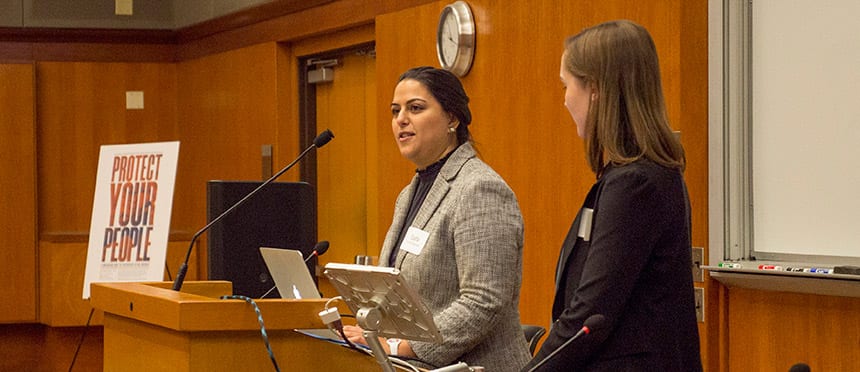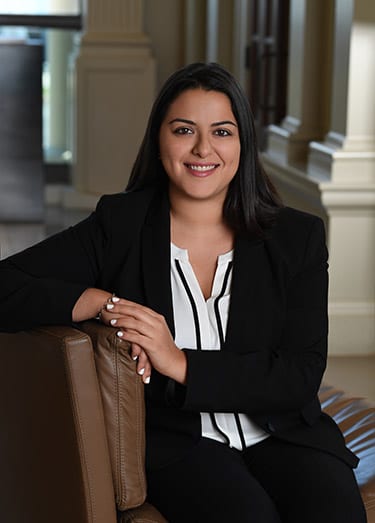
By Andrew Cohen
The easy path holds little interest for Safa Ansari-Bayegan ’20. Throughout her journey toward the legal profession, one filled with awards and accolades, she remains driven to probe the deep-rooted causes of crime—and to trek uphill helping indigent defendants.
Starting this fall, those efforts will get a huge boost thanks to her selection as an E. Barrett Prettyman Fellow. Awarded to just three 3Ls from hundreds of applicants, the coveted two-year LL.M. fellowship at Georgetown Law funnels vast resources toward developing stellar, devoted indigent defense counsel through rigorous training.
Fellows try cases and hone their skills under close faculty supervision during their first year, then take classes in clinical teaching and supervision. The next year, they assume major responsibility for providing classroom instruction and supervising students in three criminal justice-focused clinics. Ansari-Bayegan will receive a stipend of $57,000 in her first year and $60,000 in her second year, with full benefits, in addition to full tuition and fees.
“The amazing clinical experiences I’ve had here at Berkeley Law made this possible,” she says of her work with the school’s Death Penalty Clinic and East Bay Community Law Center (EBCLC). “I still have plenty to learn to become the lawyer I want to be for my future clients, and I can’t imagine a better way to begin my career than this program.”

At the Death Penalty Clinic, she has drafted major portions of a state habeas brief on behalf of an Alabama death row client. At EBCLC, she represented young people caught at the intersection of the juvenile justice and education systems in special education administrative hearings, school discipline proceedings, and juvenile record-sealing cases.
“Lawyering, especially on behalf of indigent clients facing execution, is a deeply collaborative endeavor and Safa is the consummate team player,” says Death Penalty Clinic Professor Ty Alper. “Her peers respect and admire her, and all of us in the clinic have learned a great deal from her. Safa will thrive as a Prettyman Fellow, and I know she’ll serve her future clients and students with the same zeal and determination that I’ve seen in her work for our clients.”
Support system
Ansari-Bayegan credits this immersive work—and the guidance Alper and EBCLC Education Advocacy Clinic Director Rosa Bay provided during the application process—for elevating her fellowship chances.
“From their willingness to look over countless drafts to their strategic insights about the interview process, it was a terrific reminder of what a supportive community we have as Berkeley Law students,” she says.
After taking the Washington, D.C., bar exam in July, Ansari-Bayegan will begin a six-week boot camp training on public defense, start taking misdemeanor cases, and work up toward felony cases by the end of her first year.
“It’s a rare opportunity to get really precise feedback from your direct supervisor as you go through those cases,” she says. “There are always thorny issues that come up, and it’ll be a huge plus to have a tight-knit group of students and professors to talk through strategies.”
Ansari-Bayegan’s push toward criminal indigent defense began in college. In her freshman political science class, she read a New Yorker article about a Texas prisoner who was executed even though research showed reason to further investigate the science used to convict.
“That really opened my eyes to our criminal justice system, the appeals process, and what groups badly need quality representation,” she says. “Later in the semester, a young attorney from the Texas Defender Service who helped clients facing imminent execution spoke to our class. She mentioned internship opportunities, and I wound up interning there for several years.”
A transformative day
In that role, Ansari-Bayegan made her first visit to death row. She was 19, had never set foot in a jail or prison, and wound up having powerful conversations with two incarcerated clients.
“The next time I visited death row to visit two different clients, I looked up what they had allegedly done—I was curious how that might affect my interactions with them—and it was really hard for me to reconcile the people I was talking to with what they’d allegedly done,” she says. “It made me appreciate the ability of people to really change over time, and helped me realize how important it was to humanize these individuals and see them for who they are outside of a horrible thing that happened.”
A mitigation specialist in West Texas before law school, Ansari-Bayegan was part of a legal defense team representing indigent clients facing capital charges. She helped collect records and interviewed witnesses to create a narrative that sought to humanize her clients before the given district attorney or jury, and helped promote that framework at Berkeley Law—where she recently co-organized a conference on participatory defense.
“I loved doing the work and felt really connected to the clients and their families,” she says. “But I also felt limited in what I could do without a law degree. I wanted to be the one standing next to them and fighting for them in a courtroom.”
Having experienced Berkeley Law’s clinical model, Ansari-Bayegan is eager to help share its impact with other aspiring criminal defense attorneys.
“I’m interested in uncovering the context in which some of these crimes take place; nothing occurs in a vacuum,” she says. “So many great things happen when you look through that lens and directly involve students in the strategic and ethical challenges of being a lawyer.”